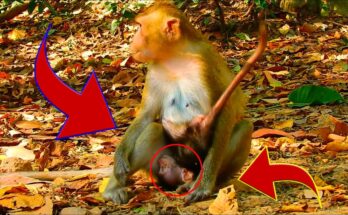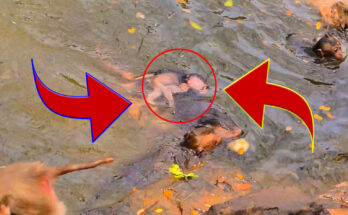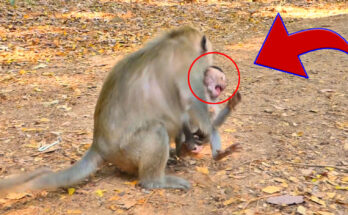In the heart of the dense rainforest, the bond between mother and offspring is one of nature’s most powerful forces. Monkeys, like many other animals, are driven by an innate need to protect and care for their young, but this relationship can be tested in the harsh realities of the wild. The bond between a mother monkey and her baby is built on years of trust, affection, and protection, but what happens when that bond is threatened? What happens when the delicate balance of life is disrupted by predators, accidents, or unforeseen circumstances? This is the story of one such heart-wrenching moment in the wild—an event that left one mother in distress as she watched her baby struggle for survival.
It all started on a bright morning in the jungle. The baby monkey, still small and helpless, clung to its mother’s fur as they moved through the treetops. Mother monkeys are incredibly protective, ensuring their babies are safe from harm and teaching them how to navigate the complex forest environment. Baby monkeys are vulnerable, often relying on their mothers for nourishment, warmth, and safety. But the rainforest is a dangerous place, where threats lurk in the shadows, waiting for the right moment to strike.
As the pair made their way through the canopy, a sudden rustling in the branches above caught the mother’s attention. She froze, instinctively clutching her baby closer to her body. It was the warning signal of a potential predator—perhaps a larger primate or a bird of prey. The mother monkey’s heart raced, her instincts screaming for her to protect her baby at all costs. But before she could act, disaster struck.
In a split second, the baby monkey lost its grip on the mother’s fur and tumbled down through the branches. The helpless baby fell, its tiny arms flailing as it plummeted toward the forest floor. The mother let out a frantic cry, reaching out to catch her child, but it was too late. The baby hit the ground with a painful thud, its cries echoing through the jungle.
The mother monkey descended quickly, her heart heavy with fear. She found her baby lying motionless on the ground, an overwhelming sense of panic filling her chest. What had happened? Was her baby okay? She carefully approached, nudging the tiny body with her hand. The baby stirred, groaning in pain but still alive. Her heart skipped a beat, but she knew this was just the beginning of a much bigger struggle.
The mother wasted no time in scooping up the injured baby, cradling it against her chest. She was determined to help, no matter the cost. But how could she protect her baby from the dangers of the jungle floor? In this moment, she was not just a mother but a warrior, willing to do whatever it took to keep her baby safe.
In the wild, a mother’s love knows no bounds. But the mother monkey was not alone in her plight. She wasn’t the only one who knew that the baby’s survival depended on quick action. Other members of the troop, sensing the urgency, began to rally together. They had seen the dangers of the forest before and understood the value of solidarity in times of crisis.
One by one, the other monkeys joined forces, creating a protective perimeter around the mother and baby. They acted as a team, using their agility to create a safe route for the baby to be transported back to the safety of the trees. The protective gestures from the troop were a testament to the deep bonds of kinship that formed the foundation of their society. Even the younger monkeys, who were not yet capable of fully understanding the gravity of the situation, rallied around the baby in a show of unity.
But the mother monkey was not just relying on her troop for help. In an extraordinary display of intelligence, she utilized her extensive knowledge of the forest to find healing herbs and natural remedies to ease her baby’s pain. She carefully picked leaves and crushed them with her hands, preparing a concoction to help with her baby’s injuries. The forest, though a dangerous place, had also provided her with the tools to survive.
The baby monkey, though weak, was slowly recovering. Thanks to the mother’s nurturing care and the help of the troop, it began to show signs of improvement. The healing process would take time, but the baby had a fighting chance, and with the support of its mother and the community, it had hope.
This experience is a stark reminder of the vulnerability of life in the wild. The strength of a mother’s love is undeniable, but survival in the jungle is not solely dependent on one individual. It takes the cooperation of the entire group—family, friends, and community—to ensure the safety and well-being of all its members. The bond between a mother and her baby monkey is a symbol of the resilience of life, even in the face of adversity.
As the baby monkey clung to its mother’s chest once more, the forest seemed a little less intimidating. Despite the dangers that lurked around every corner, the love and support of the troop had created a powerful shield that no predator could penetrate. In the end, it was not just the mother who helped her baby—it was the entire community, united in the fight for survival.


